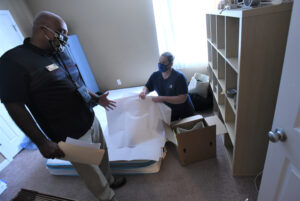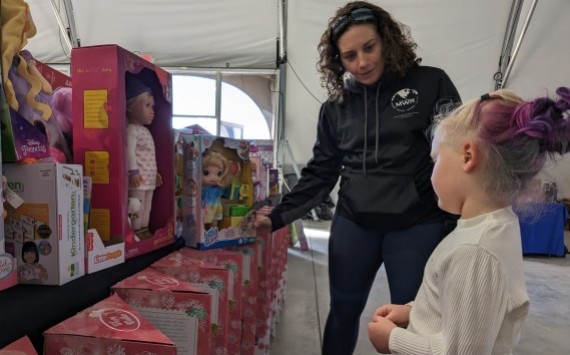Soldiers and families concerned over an upcoming permanent change of station and want the latest information can tune into the military moves family forum during this year’s Association of the U.S. Army Annual Meeting and Exposition.
“Annual family forums have been the way to communicate directly with Soldiers and Families and a way for leaders to hear what is important to Soldiers and Families,” said Lt. Gen. Jason T. Evans, deputy chief of staff for G-9. ”This year’s family forums will focus on secretary and chief of staff of the Army priorities that aim to improve the quality of life for all Soldiers, Army civilians and their family members.”
It has been a year since the Quality of Life Task Force was activated. The Army is tackling improvements in housing, health care, child care, spouse employment, PCS moves and support and resilience.
“Quality of life is about people first,” Evans said. “The Army is about taking care of people. The family forums are the venues to hear what Army leaders have done to improve life in the Army, and what they plan to do in the future.”
The PCS process can be an exciting opportunity, but can also bring additional stress and uncertainty during this time of COVID-19, said Dee Geise, chief of the Soldier and Family Readiness Division in the Army’s G-9 office.
A panel of Army leaders will discuss critical Quality of Life Task Force initiatives in the virtual “AUSA Family Forum II: Military Moves” event on Oct. 15 from 10:30-11:30 a.m., EDT. Critical improvements to housing, household goods, and child care programs will also be highlighted.

Digital Garrison app
The forum is slated to feature details on the Army’s new Digital Garrison App, Geise said. The app was released in August, providing Soldiers, families, veterans, and civilians living or working at select installations access to facility information and other services.
Digital Garrison is currently available at 60 installations with plans to add more locations in future updates, Geise said. The app “provides installation directory, gate locations and hours, fitness and recreation options, weather, event information, and more.”
The app will “certainly help a new family” by providing access to in-processing and other newcomer material, along with information from the Army & Air Force Exchange Service, Army Installation Management Command, and the Army Family and Morale, Welfare and Recreation program, Geise said.

Housing
Army leaders also remain committed to improving housing and barracks conditions. In 2019, the force completed 100 perent barracks inspections and home visits, to include “change of occupancy” to identify any life, health, or safety concerns, according to G-9 officials.
In May, senior leaders signed the Military Housing Privatization Initiative Tenant Bill of Rights. The document outlines a series of rights and procedures all Soldiers and families are authorized to receive when residing in privatized housing.
Over 100 additional workers have also been hired this year to improve the privatized housing inspection and quality assurance processes, officials added. The force is also continuing regular home inspections for safety hazards, such as mold, asbestos, peeling lead paint, and other potential hazards.

Household goods
Army Materiel Command and G-4 leadership also continue to receive feedback about the household good shipping process during COVID-19, Geise said. In turn, the Army is working to ensure all shipping companies take proper precautions to pack and move a family safely.
Moving companies still must adhere to Center for Disease Control and Prevention COVID-19 protocols when operating in a residence, G-4 officials said. These precautions include face coverings, maintaining good hand hygiene, cleaning frequently touched surfaces, and minimizing the number of personnel to meet social distancing requirements.
If personnel choose to move their household items themselves, a new Department of Defense Joint Travel Regulation now gives them an added incentive to do a personally-procured move, or PPM.
Until Dec. 31, Soldiers authorized for a PPM can receive a payment equal to 100 percent of the estimated cost that the government would pay a moving company. The PPM process also provides personnel more flexibility and the option to avoid contact with outside agencies.
“All the primary things that you think about during a PCS are covered” during this AUSA family forum, Geise said. It is an opportunity for senior leaders to provide “you with information on initiatives and programs to help you during this entire process.”
Child care initiatives
Providing quality and affordable child care and youth services also remains a top priority, officials said. To support, the force developed a child development center facility modernization and recapitalization plan, which will target critical CDC projects over the next five years.
The force also plans to expand its Army Fee Assistance Program to offset the cost of care at other facilities when there is no on-post child care available on installations. Families enrolled in the program receive monthly fee assistance, paid directly to a child care provider, to offset costs.
Additionally, Army officials are marketing the spouse employment opportunities of the Family Child Care, or FCC, program and project to have about 275 FCC providers across the Army by fiscal year 2021. Growth in FCC will help reduce the wait times for incoming personnel and provide families an additional option for child care, officials said.
Editor’s note: Those interested in watching the family forum can register https://www.ausa.org/military-families/family-readiness-meetings to attend the AUSA annual meeting.












